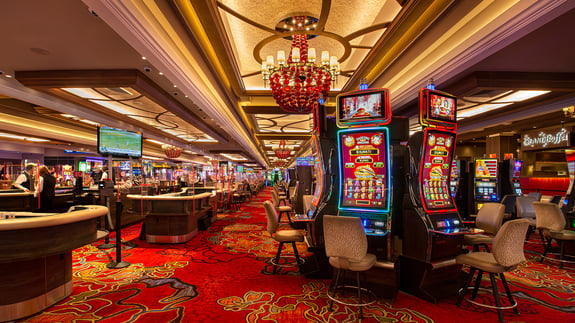
Gambling games have long been a captivating entertainment option, drawing numerous of players from different cultures around the globe. From the opulent casinos of Vegas to the bustling gambling halls of the Cotai Strip, these games serve as a common thread that unites people across a variety of backgrounds. The allure of fortune, tactics, and risk entices not only those seeking to gamble for profit but also those seeking a sense of community.
The influence of casino games extends significantly past the gaming floor. They often embody the values and principles of the communities in which they prosper. Games such as Texas hold ’em, pontoon, and the spinning wheel have woven themselves into the mosaic of cultural phenomena, influencing multiple fields from films to clothing. As we explore this captivating intersection of luck and life, we can gain insights into how these games shape and are shaped by the world around us.
Historical Evolution of Gambling Games
The roots of casino games can be traced back to old cultures, where gambling in various forms was widely engaged in. In Ancient China, around two thousand three hundred years before Christ, a type of lottery known as Keno was common, while in ancient Rome, soldiers would often gamble on the consequences of their matches. The idea of using luck for amusement and income evolved over the ages, leading to the formation of more formal activities. By the late Middle Ages, gambling houses initiated to emerge in the continent, notably in Italy, which presented early forms of famous games still practiced today.
As gambling expanded fame in the continent, the 17th and 18th centuries saw the appearance of casinos as specialized locations for gaming. The initial official gaming venue, the Ridotto, was set up in Venice in 1638, offering activities like Baccarat games and the game Faro. KO66 This period marked a major turning point, as casinos started to draw not just the high society but also the expanding middle class. The refinement of activities grew, leading to the development of new guidelines and versions that enhanced the experience of players.
In the 19th century, the industrial age and transformations in social conventions further altered the terrain of gaming activities. The introduction of the game of roulette and contemporary slot machines attracted a more diverse crowd, and gaming houses became seen as legitimate recreation. This time witnessed the worldwide proliferation of gambling, as gambling houses expanded from European nations to the New World, culminating in the creation of the famous Las Vegas Boulevard in the twentieth century. The evolution of casino activities has continued into the current era, incorporating technology and online platforms, allowing them open to a global audience.
### Cultural Relevance across Various Communities
Gambling games have significant social value in numerous communities around the world. In Las Vegas, the very essence of the urban landscape is woven around casinos, where gaming is not just a pastime but a central aspect of entertainment and community interaction. The dazzling lights and lively atmosphere attract millions, showcasing how games of chance can influence local economical structures and cultural uniqueness. This setting transforms the notion of leisure into an enriching experience that shapes fashion, music, and even film.
On the other hand, some cultures approach wagering with more caution, considering it through the lens of ethical beliefs and heritage. A case in point, in numerous Eastern societies, games like Mahjongg and Pai Gow are steeped in history and have significant social implications. These games are often played during gatherings and occasions, fostering social ties and solidifying family ties. The act of participating in these games goes beyond mere entertainment, reflecting ethics such as honoring elders and the value of communal fun.
Meanwhile, in European countries such as the principality of Monaco and Italy, games of chance serve as symbols of opulence and elegance. The elegant atmosphere of these locations attracts both tourists and native inhabitants, maintaining a sense of status and elitism. The art of poker and the strategic features of games like the game of baccarat are appreciated, shaping interpersonal interactions and cultivating an allure that fascinates a diverse audience. This emphasizes how casino games can simultaneously echo and shape cultural perspectives towards risk, gain, and social interaction.
Financial Influence and Tourism
Casino games play a significant role in the financial context of many areas, particularly those that depend significantly on tourism. The revenue produced from gambling establishments fuels local economies, creating employment opportunities not only within the casinos but also but also in related sectors such as hospitality, restaurant services, and entertainment. This influx of tourists, drawn by the attraction of gambling and the overall casino experience, stimulates expenditure across multiple local enterprises, contributing to the economic health of the area.
The existence of casinos often leads to the construction of infrastructure, including lodging, public transit, and leisure amenities. These developments are essential in enhancing the overall visitor satisfaction, making locations more attractive to visitors. Additionally, many casinos invest in local communities through sponsorship of activities and charitable initiatives, further integrating themselves into the community structure of the region. Such contribution not only supports economic growth but also cultivates a positive image of the casino industry.
Moreover, the worldwide appeal of casino games drives competitive tourism, with locations vying to attract gamblers from around the world. Iconic locations like Las Vegas and Macau have become synonymous with gambling culture, drawing millions annually. This advantage encourages innovation and variety within the gaming industry, influencing developments in entertainment and hospitality that resonate beyond their limits. The consequences of this visitor influx extend far, impacting local economies and cultural interactions on a worldwide scale.